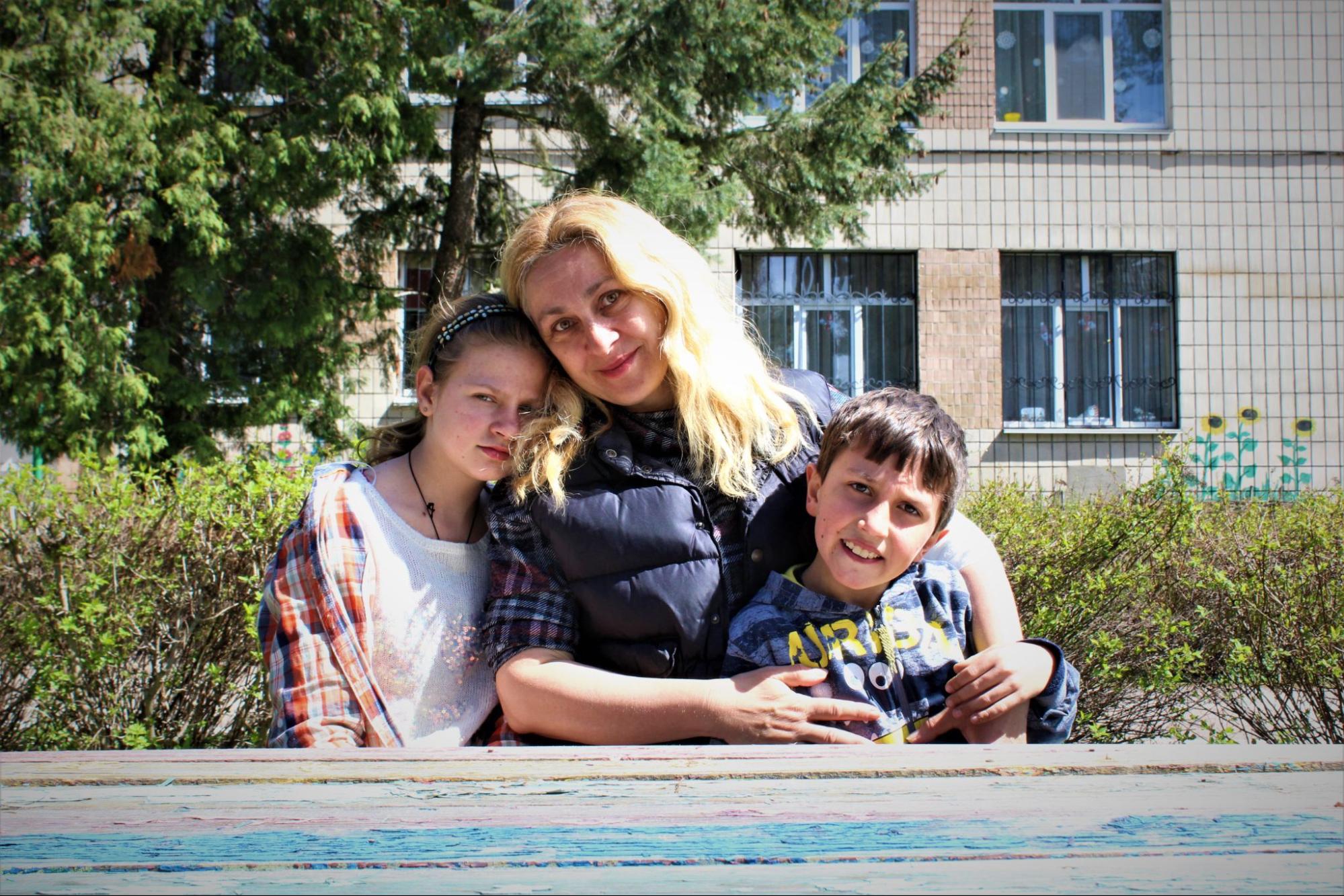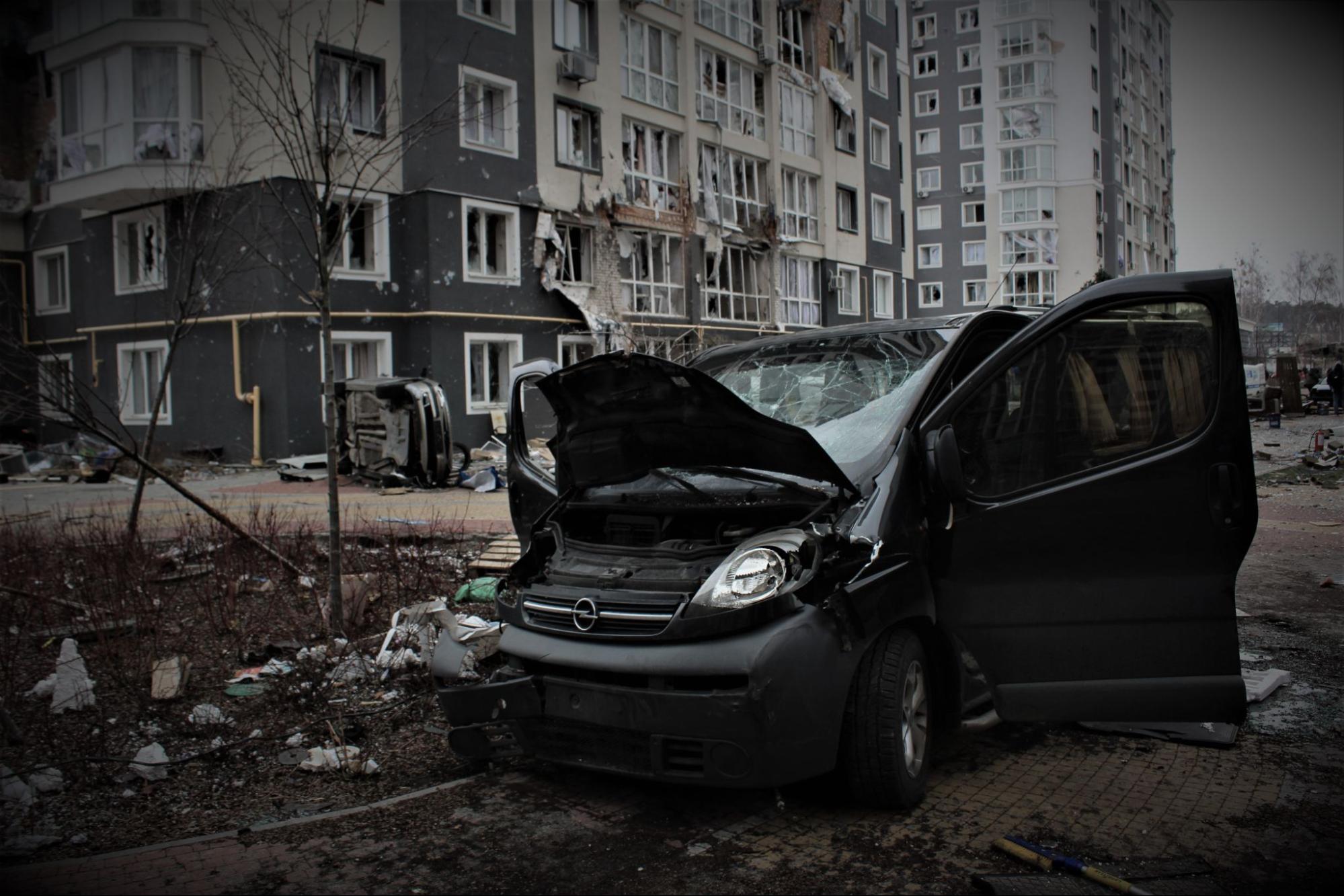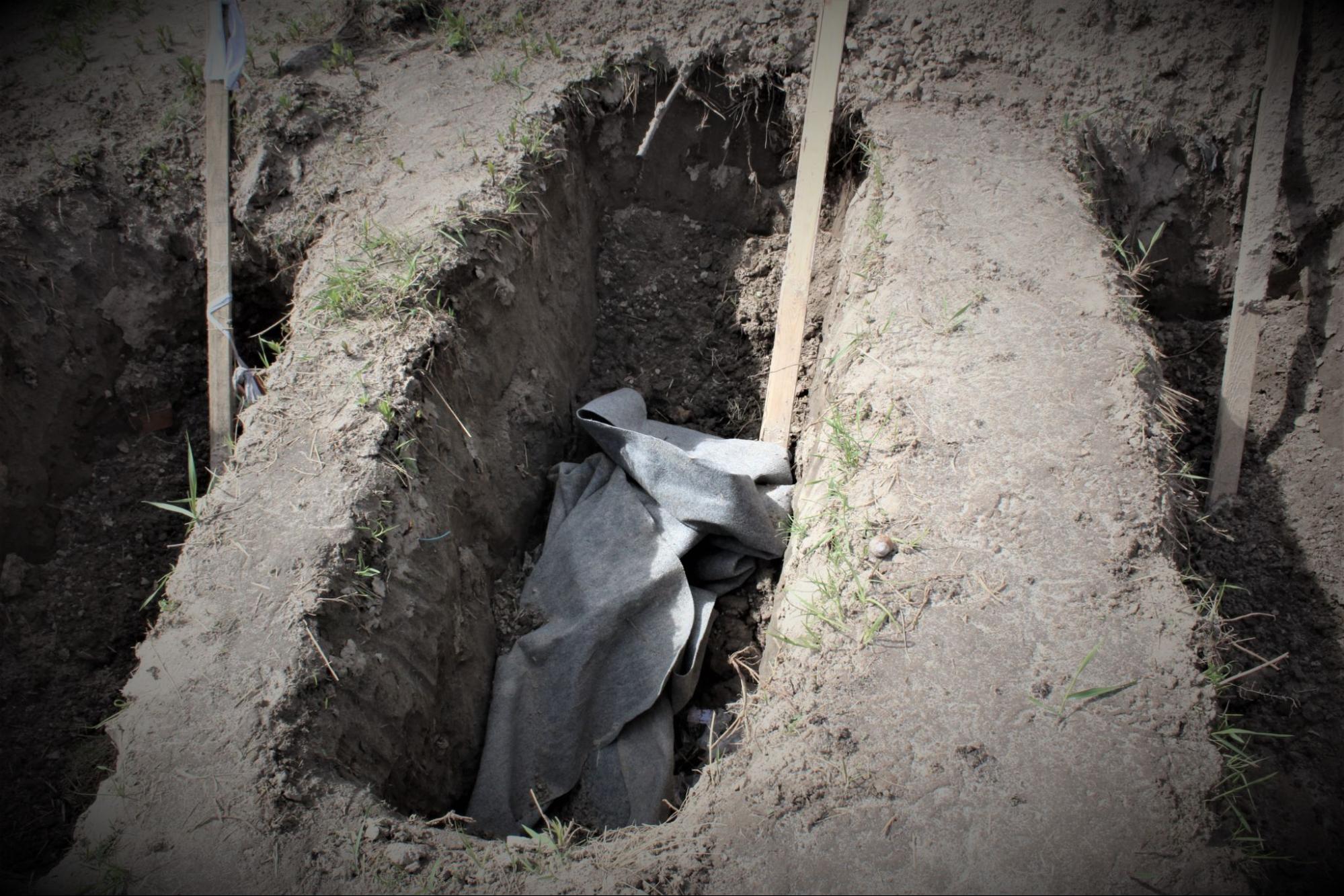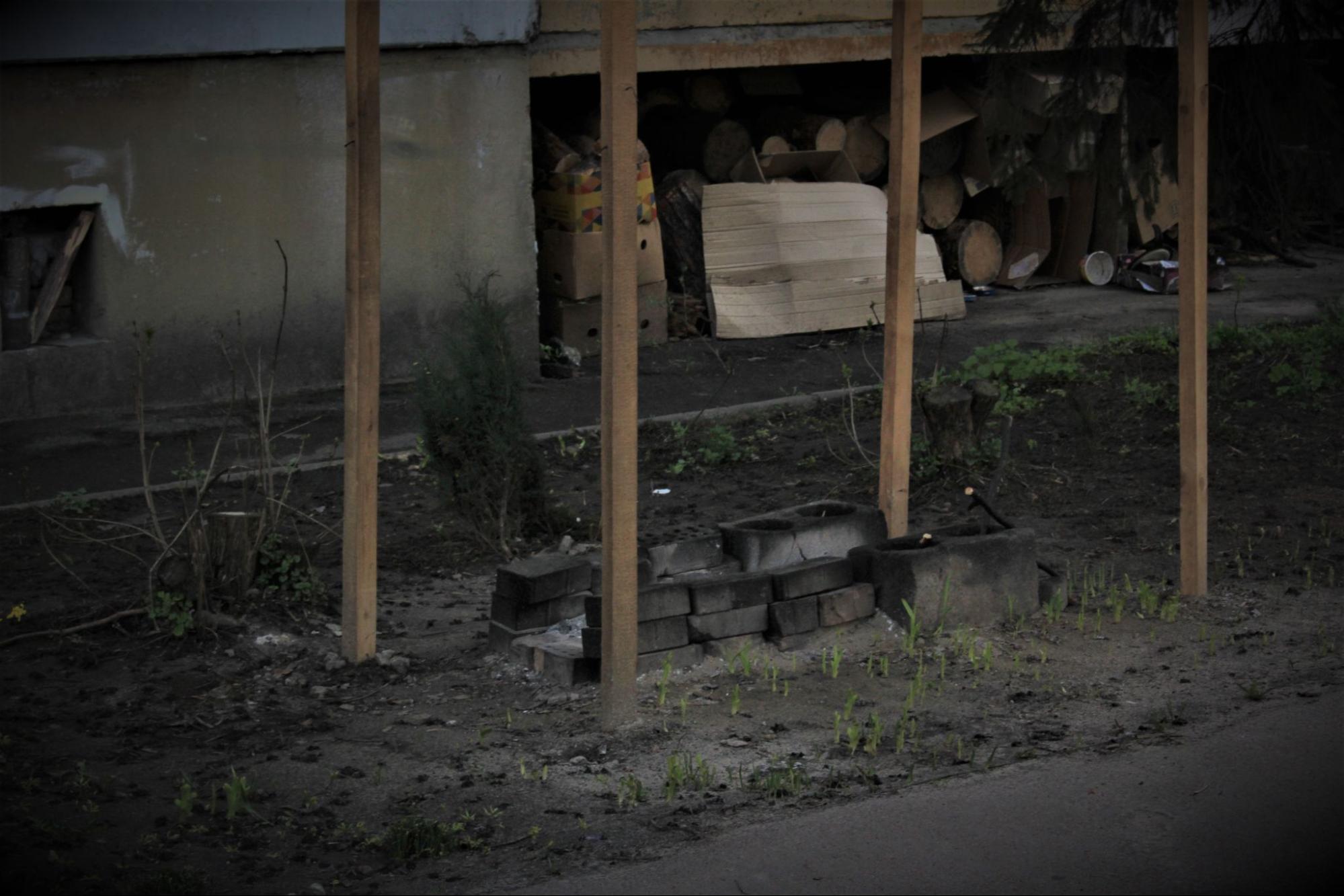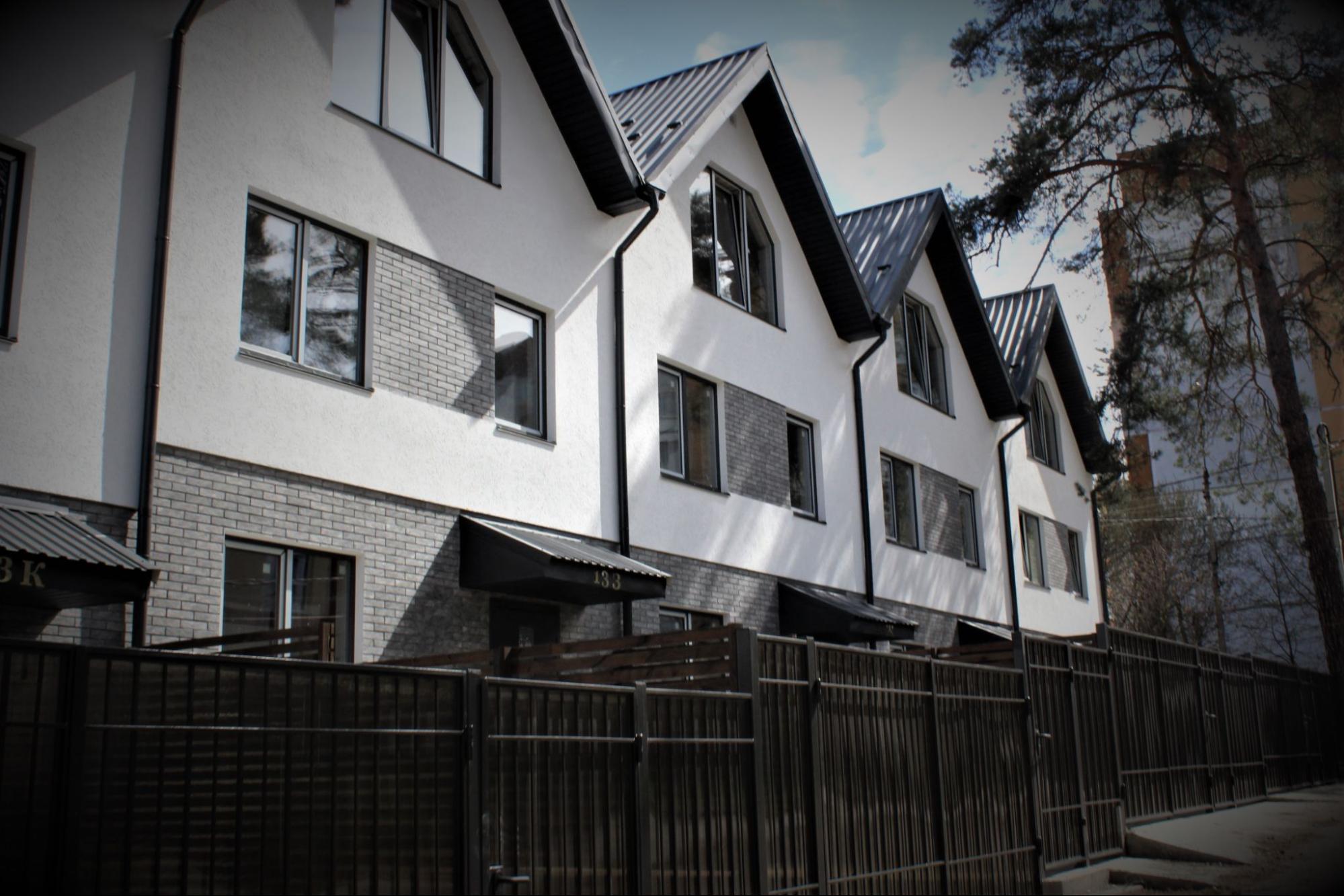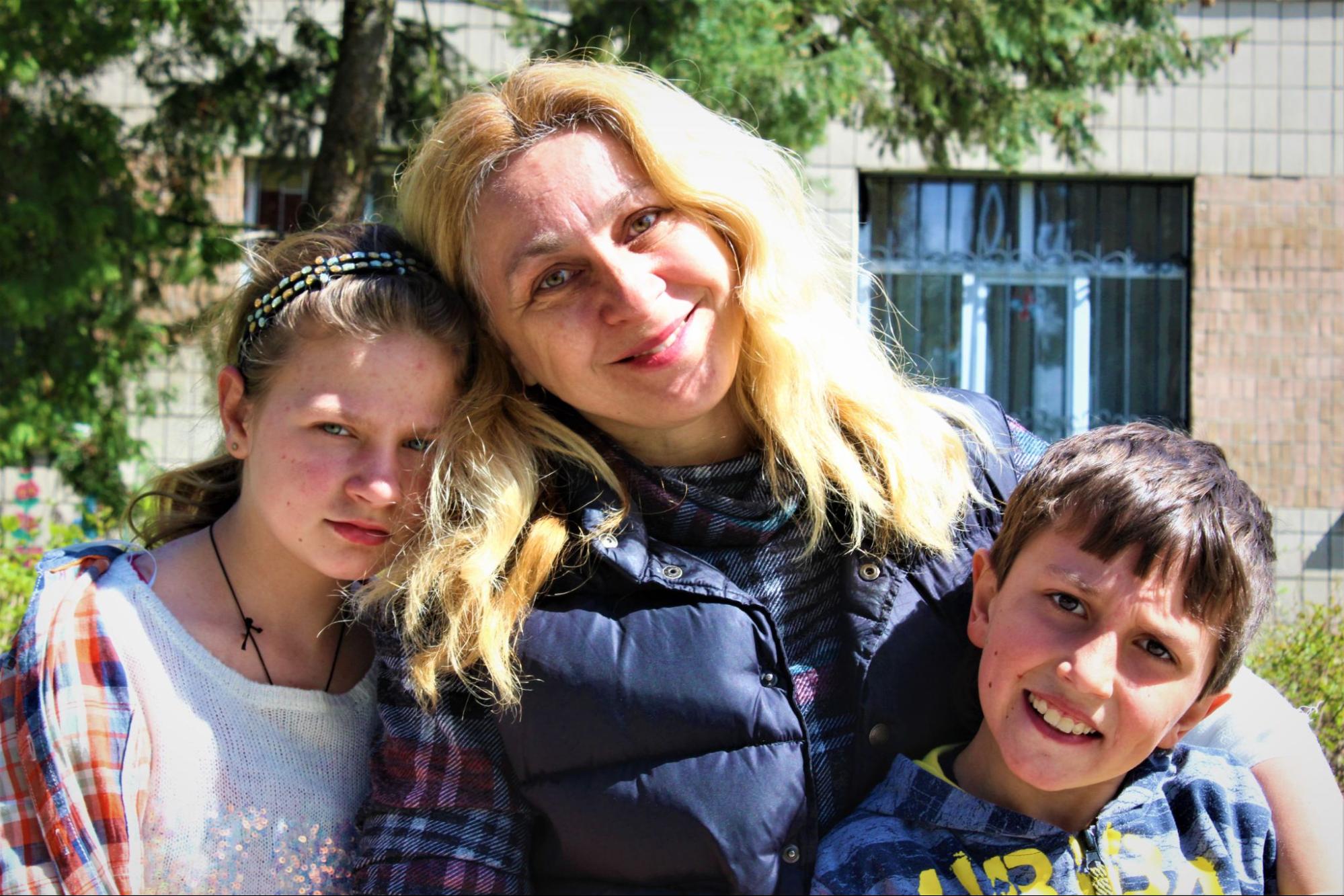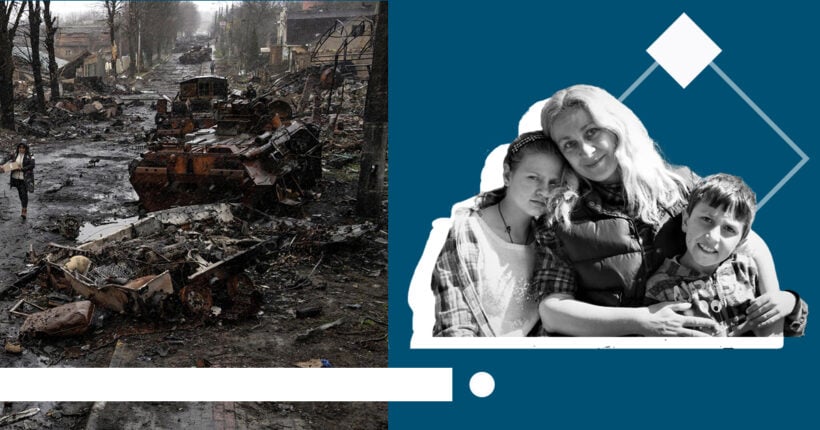
We recorded this story of Vladyslava Liubarets from Bucha on the grounds of a kindergarten, which became a shelter for her and her two children for nearly 40 days. Vladyslava's family was one of the dozens who survived the entire occupation in Bucha in a small basement, which meant getting under the occupiers' heavy shelling.
Before our conversation, little Yevhen, hearing that his mother had begun to talk about the war, approached her and asked her to hug him. Vladyslava says it has been commonplace. It has been difficult for little Yevhen to recover from the occupation. It takes time.
Rubryka tells the story of what Vladyslava's family had to go through.
"My father was taken prisoner. I couldn't believe it"
My name is Vladyslava Liubarets. I'm a resident of Bucha; I was born here, and I'm very proud of that. Bucha was beautiful before the war: a green city where people came with pleasure to relax.
I'm a scholar and professor at the Drahomanov National Pedagogical University, Department of Management, Innovative Technologies and Socio-Cultural Activities. My children study at an inclusive specialized school in Kyiv. They stay there all week, and on weekends I pick them up. On February 24, the school principal called me and told me that the children should be picked up from Kyiv. It was Thursday; I asked why I had to pick them up at 5 am, and she told me the war had started. Ten minutes later, I heard an explosion.
We live next to Hostomel. I woke my husband, and we ran outside and saw a glow: it was clear that the airport in Hostomel was on fire. I could tell by the sound that the occupiers had blown up some mighty building. Then explosions began, helicopters followed, and our Ukrainian jet fighters flew after them. Only then did we realize that the war had begun.
My husband went to Kyiv to pick up the children. They got home at 2 pm. They were dropped off on the road because the taxi driver said he would not go further. They walked and saw explosions around.
I was at home with my daughter-in-law and her one-year-old baby. The three of us, while waiting for my husband with the children, called everyone and said that we had the fighting here. Everyone told me: don't panic, you sow panic. Two hours later, my sister called me and said our father was in captivity. I couldn't believe it. He works in Hostomel and just had his shift that day, and I didn't know it. He's a civilian who provided maintenance at the airport.
He later said that they had been captured, our military had been taken prisoner, and the civilians had been locked up in a bunker and abused. They were later released and fled. They were wounded. Cars were still moving on the Warsaw highway, and the injured were put in these cars to be taken to the hospital in Bucha. My father said everything was taken away from him: documents and his things. That is, he went on foot to my sister's in the things he was detained. He didn't go home because the russians took the keys away from him.
I started calling Kyiv and saying that the russians were already capturing people and started abusing civilians. Nobody believed me; the news didn't show it yet. With each passing hour, there were more explosions. We heard that the shooting had already begun and understood that people were dying. There was fear. The news said everything would be fine, and there was no need to panic. The next day our city was already occupied. Unfortunately, I don't have a car. No public transport was running, and I saw the shot cars on the street in front of our house. I understood that we couldn't go out safely. The russias continued bombing more and more.
When the tanks came in, we realized that the city was surrounded: on one side of our house was the highway, and on the other was the kindergarten. It became evident that the shooting was chaotic. Doors and windows flew out of the homes. As soon as someone looked out of the window, they heard automatic gunfire.
"A 14-year-old boy came running and said: my dad was killed"
Our houses don't have basements because we live near the railway. So people from all over the street ran to the basement of the kindergarten. There were even people from Vokzalna Street—the famous street with many burned military equipment.
The first time, we somehow made our way to the houses, found food, and took it to the bomb shelter. Eventually, the shots began to sound constant, and there was not even a moment of silence.
Wounded people got to the shelter. They said that there were five checkpoints around us. Among them are two Kadyrovite checkpoints.
One day, a boy came running. He's 14 years old, and his name is Yura. He went into the basement and said, "My dad was killed." It happened on the neighboring Tarasivska Street between houses №3 and №1. The two rode a bicycle when they said the corridor was allegedly open. They decided to visit their grandparents. As they were riding, the russians started firing at them with automatic gunfire. Three shots killed the father; the terminal shot was in the head in front of his son. The son asked the russians if he could approach his father, and they shot him in the shoulder. Then there was another shot. He was aimed in the head, but because of the pain after the arm injury, he bent down, the hood went down, and the bullet hit only the hood, not the head.
We gave him first aid but had no medication. We tore clothes, bandaged him with them, and used women's pads.
The men with us took him home to inform his mother that a tragedy had happened. A day later, Yura's grandmother came to us and asked the men to help bury her son-in-law. When she went to the checkpoint to pick up the body, she wasn't immediately given it; the occupiers said: there was no older man. Then she went again and saw a mountain of shot men. She was told to "choose yours." She recognized her son-in-law by his legs, and he and another woman in a wheelbarrow brought him to the yard.
Only women and the elderly could walk around the city then. You know what they did with the young ones… And when there was an exhumation, investigators and experts came. They asked to dig up the bodies of the same buried men. They were witnesses.
"We drank water from the heat pipe radiator"
We understood perfectly well that we only had to appear on the street to be shot immediately. The russians liked to say, "Let's take you off your rations." We had no water, no light, no gas. It was freezing, even snowing. People went out in fear and set up fires and cooked food. It irritated the ruscists. One day they drove up in a tank and said: you have 5 minutes to get away from the grills. They razed these braziers to the ground.
It was also impossible to collect water. One man saw in the morning that there was no tank and went outside with bottles and a dog. He was immediately shot in the forehead. Nobody knows where that sniper was. Nobody could take the man away for a long time because the occupiers shot at the feet of those who wanted to approach. There are many such cases.
A young man ran up to us—the russian soldiers shot his nose— and shouted that his friend had been killed, and he had just buried him in the woods.
The ruscists even pulled things, gold, and shoes off the dead. It was like seeing a corpse in clothes; the next day, it's without clothes.
We told each other we were sitting in a shelter, but it wasn't a real bomb shelter. It's just a basement. There was wet ground and sewer pipes, no light, no water, nothing. The first time we had food, then we had to find it. Thanks to the fact that it is a kindergarten, there were vegetables in the pantry. When we ran out of vegetables, we had to go out and look. That was the worst.
At first, we had ten children. Three of them managed to leave with their families on the third attempt. The rest stayed. At first, we ate pumpkins and saved porridge. We drank water from the heat pipes.
At first, we could heat water; then, it was forbidden, and we drank raw, dirty water. The food was divided into pieces, mostly given to children. Eventually, people began to get sick. Thirty-five days had been wet and cold. I washed the children outside because it was warmer than in the basement. My children had bedsores and coughs. The younger one often had nosebleeds.
"My son's favorite expression: be careful out there"
Because I'm a teacher by education, I understood that I needed to create conditions for children to feel in control. Yevhen often asked me: is it morning, lunch, or evening? Because it was dark all the time. At first, we took care of them, and they did nothing, but we did everything. Then we realized it was worse and started taking them with us to do something. We allowed them to cook with us. They were shown how to clean water through a cloth. That was a distraction.
There were no children's toys in the basement, so we played adult games, like backgammon. Although the children didn't understand how to play correctly, they were distracted. When we could charge the phones, we shone on the floor and painted on the ground.
No matter how hard we tried to distract the children, they heard us, saw the wounded, and closed off. It helped to hug them, sleep together, and warm them up to keep warm.
There was no need to explain anything. My daughter Anastasia doesn't curse but says that "putin is a thief" and "putin is the devil." I didn't explain it to her. It's just that children hear our conversations and highlight the basics.
Sometimes there's more wisdom in children's words than in ours, adults. My son's favorite expression is, "Be careful out there." We told everyone who wanted to go outside to be careful. That's how he picked it up.
"When the silence came, we thought the russians had dropped an atomic bomb"
On March 29, we had tanks nearby. We heard a call from the russians in the morning. Then the tanks buzzed near us. On March 30, we woke up to no shooting, no equipment, or explosions.
When the silence came, it was the worst. We carefully went upstairs and saw that no one was there. We thought the russians dropped an atomic bomb on us. So we decided not to take risks and not go out on this day, but our Ukrainian curiosity still won.
On March 31, we looked out, saw people walking and breathing, and only then did we leave. We feared moving around because we knew the russians could mine the territory. Something exploded somewhere; perhaps the animals exploded on tripwires.
We carefully reached the ATB supermarket and saw Ukrainian soldiers. When we saw these soldiers, it was the happiest moment in my life. People just cried with joy. I can compare this joy probably only to the birth of a child.
Eventually, we began to return to life. At first, we didn't go to the houses; the military advised against it. In addition, our homes weren't suitable for life; it was freezing. During the day, we cleaned, sealed the windows, and went to our shelter again at night.
The consequences are still echoing. One day before Easter, a shooting started near us. It turned out that not all russians left. Several people remained in the new buildings. The children were playing on the playground at that time.
Houses where the russian orcs hidДо того ж, дуже багато мінувань. Ми вже знаємо: якщо щось вибухнуло до 16-ї години, то це наші сапери, а якщо пізніше, то швидше за все хтось загинув…
"Wisdom, hope, and faith always win"
My heart aches for the children because they had to go through it. When we ran from place to place, Yevhen fell, and his nose and ears were bleeding. We couldn't figure out if it were a fall or pressure. We stopped it with the drugs that we had. He lost consciousness, and when he woke up, he saw he was in the blood and terrified. Anastasia saw this and was frightened.
When the russians bombed us, the sand was constantly falling from the shelter's ceiling and going to the food. We ate poorly. Plus, nerves, we had nausea because of stress.
When it was all over, I cried for the first five days, and then I realized I couldn't because I had children! They watch, and I need to act, adapt, and plan. I primarily hope to take care of my children's health.
I'll do my best for them to have a normal life. They're patient, wise, and brave, and wisdom, hope, and faith always win.

"Sitting at home and not going anywhere": life in the occupied Melitopol

The one who got out of Mariupol: mobile crematoria, remains of bodies on streets, lack of water, food and opportunities to keep warm. Life in occupied city and escape from it

People survived humanitarian catastrophe, crimes of occupiers and daily bombings – reports from villages near Ivankiv

Survived under fire: Larysa from Bucha went through an uphill tank battle and met invaders twice
Newsletter
Digest of the most interesting news: just about the main thing




